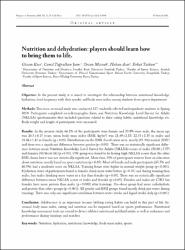Nutrition and dehydration: players should learn how to bring them to life
Citation
Köse, G., Şam, C. T., Mızrak, O., Acar, H., Tutkun, E., (2020). Nutrition and Dehydration: Players Should Learn How to Bring Them to Life, Journal of Nutrition and Internal Medicine. 22 (3). pp. 1-9.Abstract
Abstract
Objective: In the present study, it is aimed to investigate the relationship between nutritional knowledge, hydration, food frequency with their gender and body mass index among students from sports department.
Methods: This cross-sectional study was conducted 127 randomly selected undergraduate students in Spring 2019. Participants completed sociodemographic form, and Nutrition Knowledge Level Survey for Adults (NKLSA) questionnaires that included questions related to their eating habits, nutritional knowledge etc. Body weight and height of participants were measured.
Results: In the present study, 66.1% of the participants were female and 33.9% were male, the mean age was 20.5±4.15 years; mean body mass index (BMI, kg/m²) was 21.49±2.13; 22.35±2.35 in males and 21.06±1.87 in females (p<0.05). Distributions in the BMI classification were, mostly (91.3%) normal (NW) and there was a significant difference between gender (p<0.05). There was no statistically significant difference between mean Nutrition Knowledge Level Survey for Adults (NKLSA) scores of males (50.00±5.57) and females (50.16±6.36) (p>0.05). UW group was found to be having high NKLSA scores than the other BMI classes but it was not statistically significant. More than 50% of participants want to have an education about nutrition, mostly based on sports nutrition (p<0.05). Most of female and male participants (65.5% and 60.5%) had a moderate score on NKLSA. Training hours were higher in normal weight group (p<0.001). Hydration states of participants found as females drink more water before (p<0.05) and during training than males, but males drinking more water in a day than females (p<0.05). There was no statistically significant difference between mean NKLSA scores of males and females (p>0.05). Females and males ate CHO but females have more protein than males (p<0.000) after trainings. Pre-obese group had more carbohydrate and protein than other groups (p<0.001). All gender and BMI groups found mostly drink just water during trainings. There was only one significant correlation between water intake and liquid intake daily (p<0.001).
Conclusion: Adolescence is an important because lifelong eating habits can build in this part of life. Increased body mass index, eating and nutrition can be impaired based on sports performance. Nutritional knowledge assessment tools are crucial to detect athlete’s nutritional and fluid intake as well as endurance and performance during trainings and matches.


















